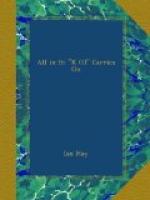In all Sports, Winter and Summer, the supremacy of the Practical Joke Department is unchallenged.
II
Meanwhile, up in the trenches, the combatants are beguiling the time in their several ways.
Let us take the reserve line first—the lair of Battalion Headquarters and its appurtenances. Much of our time here, as elsewhere, is occupied in unostentatious retirement to our dug-outs, to avoid the effects of a bombardment. But a good amount—an increasing amount—of it is devoted to the contemplation of our own shells bursting over the Boche trenches. Gone are the days during which we used to sit close and “stick it out,” consoling ourselves with the vague hope that by the end of the week our gunners might possibly have garnered sufficient ammunition to justify a few brief hours’ retaliation. The boot is on the other leg now. For every Boche battery that opens on us, two or three of ours thunder back a reply—and that without any delays other than those incidental to the use of that maddening instrument, the field-telephone. During the past six months neither side has been able to boast much in the way of ground actually gained; but the moral ascendancy—the initiative—the offensive—call it what you will—has changed hands; and no one knows it better than the Boche. We are the attacking party now.
The trenches in this country are not arranged with such geometric precision as in France. For instance, the reserve line is not always connected with the firing-lines by a communication-trench. Those persons whose duty it is to pay daily visits to the fire-trenches—Battalion Commanders, Gunner and Sapper officers, an occasional Staff Officer, and an occasional most devoted Padre—perform the journey as best they may. Sometimes they skirt a wood or hedge, sometimes they keep under the lee of an embankment, sometimes they proceed across the open, with the stealthy caution of persons playing musical chairs, ready to sit down in the nearest shell-crater the moment the music—in the form of a visitation of “whizz-bangs”—strikes up.
It is difficult to say which kind of weather is least favourable to this enterprise. On sunny days one’s movements are visible to Boche observers upon distant summits; while on foggy days the Boche gunners, being able to see nothing at all, amuse themselves by generous and unexpected contributions of shrapnel in all directions. Stormy weather is particularly unpleasant, for the noise of the wind in the trees makes it difficult to hear the shell approaching. Days of heavy rain are the most desirable on the whole, for then the gunners are too busy bailing out their gun-pits to worry their heads over adventurous pedestrians. One learns, also, to mark down and avoid particular danger-spots. For instance, the southeast corner of that wood, where a reserve company are dug in, is visited by “Silent Susans” for about




